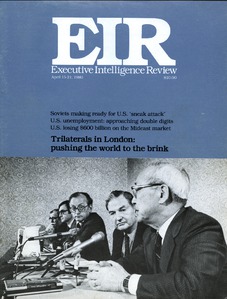Departments
From the Editor-in-Chief
by Daniel Sneider
Editorial
by Nora Hamerman
Deregulation is economic warfare.
Dateline Mexico
by Josefina Menendez
“A most inopportune visit.”
Science & Technology
by Dr. Morris Levitt
The Soviets’ ambitious nuclear program.
Campaign 1980
by Kathleen Murphy
Congressional Calendar
by Barbara Dreyfuss and Susan Kokinda
Facts Behind Terrorism
by Jeffrey Steinberg
Rebuilding the Black Liberation Army.
Economics
U.S. Unemployment: It’s Approaching Double Digits
by Lydia Schulman
Paul Volcker’s high-interest, low credit strangulation of American industry is not only sending inflation toward hyperinflation, but now, unemployment, too, is approaching depression levels. Most of it, moreover, is concentrated in the industries that are America’s economic foundation.
Domestic Credit
by Lydia Schulman
The Fed’s dilemma.
Gold
by Alice Roth
Mr. Hunt was pushed.
Foreign Exchange
by Richard Katz
The dollar’s new decline.
Agriculture
by Susan B. Cohen
Carter planning dairy deregulation?
Trade Review
Business Briefs
Special Report
Trilaterals in London: Pushing the World to the Brink
by Christopher White, Robert Dreyfuss, Gretchen Small, and Dennis Small
Meeting in London the last week in March, the elite Trilateral Commission set forth Anglo-American policy in the face of global political and economic crises: fascism in the advanced sector, and genocide in the underdeveloped sector.
I. The Trilateraloids Speak
Miyazawa and Bertram on sacrificing national interests and projecting military power.
II. The Chosen Regional ‘Hot Spots’
by Robert Dreyfuss, Douglas DeGroot and Gretchen Small
Destabilizations in the Mideast, Africa and the Caribbean lower the threshold for general war.
III. Brandt’s Subcommission
by Dennis Small
Behind Jamaica’s “break” with the IMF is a plan to use a “world development fund” to make the world a “global village”. Included: the speech of Sir Shridath Ramphal.
International
Soviets Make Ready for U.S. ‘Sneak Attack’
by Rachel Douglas
In Moscow’s view, the “incalculable” Trilateral Commission administration in Washington could provoke world war at any time. All published commentaries on political events are written from the military standpoint, and there is clearly very little in the way of U.S. foreign policy adventures the Kremlin is inclined to tolerate.
Italy: Aldo Moro’s Enemies Take Over the Government
by Muriel Mirak
An on the scene report from Muriel Mirak: how Washington and London have produced the most disgraceful governing coalition in Italy’s post-war history.
Why the Carter Administration Is So ‘Incalculable’
by Criton Zoakos
EIR-FEF India Conference Draws World Attention
by Daniel Sneider
Pentagon Claims Development of New ‘Miracle Weapon’
by Susan Welsh
It’s an anti-tank missile, useful in the kind of war that will never be fought.
International Intelligence
National
U.S. Losing $600 Billion on the Middle East Market
by Judith Wyer
The Persian Gulf nations will offer about $600 billion in development contracts over the next five years. While Washington continues to constrain U.S. business abroad, Europe, Japan, and South Korea will win the contracts and with them billions of recycled petrodollars.
The Contracts and Their Petrodollar Link – America’s Competitors in the Gulf Market – The Eximbank: Just a “Candy Store”?
National News



